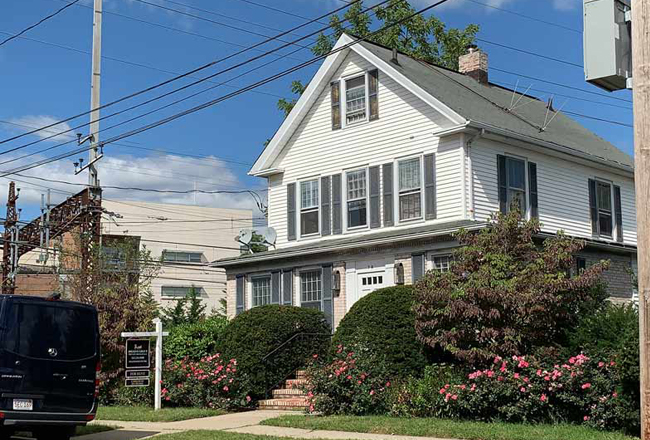 The HomeGoods retail property at 3 E. Main St. in Mount Kisco has been sold by The Kempner Corp. to an undisclosed buyer for $6,829,350.
The HomeGoods retail property at 3 E. Main St. in Mount Kisco has been sold by The Kempner Corp. to an undisclosed buyer for $6,829,350.
The announcement on Thursday said that the buyer was making the purchase as a 1031 exchange, referring to Section 1031 of the Internal Revenue Code that allows an investor to reinvest the proceeds from a property sale in a new property and defer capital gains tax.
Involved in bringing about the HomeGoods sale was New York City-based real estate investment brokerage firm B+E. It has developed a transactional platform on the internet specializing in the sale of net lease commercial properties occupied by a single tenant and 1031 exchanges.
While the firm has offices in Chicago, Atlanta, Tampa and San Francisco in addition to New York, its online presence allows clients around the country instant access to the 4,000 to 4,500 single-tenant net lease properties it has listed. Parties that have registered with the site can use it to review an offering memorandum, pursue due diligence and place an offer. They also have access to the firm”™s staff.

“There”™s always a senior broker on your trade. It feels very much like everything you know about how commercial real estate works,” Camille Renshaw, CEO and co-founder of B+E, told the Business Journal. “We have the same brokerage laws, same licenses. It”™s high-tech plus old-fashioned customer support and we don”™t believe it can be done any other way.”
During her career, Renshaw has been involved in closing real estate transactions with an estimated value of $30 billion. She was named one of “NYC”™s 15 Women to Watch in Real Estate” by Sokol Media and was recognized as a “Woman of Influence” by Real Estate Forum. She is an executive in residence with the NYU Stern School of Business and an advisory board member for a data program at Rutgers University.
The HomeGoods property in Mount Kisco covers about 24,834 square feet on 1.24 acres of land and includes parking. The retailer has a new 10-year double-net lease with four renewal options for five years each. B+E”™s internet site showed that the HomeGoods property was posted for sale on Jan. 23 at a price of $7.45 million.
Properties shown on the B+E site differ widely in price, such as $56.5 million for a five-property furniture store portfolio in Schaumburg, Illinois, and $2.1 million for the Creative Music Center in Monroe, Connecticut. The Monroe property at 701 Main St. is said to be producing a net operating income of $177,065 with 10 years left on the retailer”™s lease.
“We trade all over the country and I think we”™re getting some of the listings we”™re getting because we bring the unknown buyers from other parts of the country,” Renshaw said. “I would say at this point we”™re the only brokerage firm that does this. I imagine that will change, but at this point we”™re the only group where you can go online, log in and submit a letter of intent. That”™s very different.”
Renshaw had been working as part of a traditional brokerage team at the Stan Johnson Co. in New York City and then her team moved to the Google-funded Ten-X, which also was involved with Auction.com. Scott Scurich, who worked with Renshaw to start B+E and is its president, also was at Stan Johnson and then Ten-X. His background includes working with Cushman & Wakefield”™s capital markets group in Atlanta.
“I started coding when I was in 7th grade,” Renshaw said about her longtime interest in computer software. “In my 20s, I had several high-tech startups and with the success or sale of several of them, my family stepped in and encouraged me to start investing in commercial real estate.”
Renshaw said that the segment of real estate in which she has been concentrating represents about $6.5 trillion in value.
“It”™s actually a pretty robust segment and includes office, industrial, retail and medical and a lot of odd property types like casinos or a plant nursery.” She said the market segment actually has a lot in common with stocks and bonds for investors. “You”™re able to construct cash flows much the way you would with a stock or bond or other type of equity investment. In a true net lease environment, all responsibility is with the tenant and it becomes kind of, as my grandfather would call it, a ”˜coupon-cutter.”™”
Renshaw said that using a 1031 exchange when buying real estate that is occupied by tenants with net leases is “really great for generational transition of wealth. The family could sell a McDonald”™s or a distribution center or anything and trade in one or more of the assets. You could build a family portfolio that way. And, because it is a hands-off investment, you could leave it to the grandkids and not have to worry about the fact that the grandkids don”™t really understand construction. They don”™t have to know what a boiler is or where it is or how to fix it.”
She said that investors looking to buy stocks or bonds are reluctant to work with firms that don”™t have a high-tech platform enabling rapid-fire retrieval of data.
“What we”™re trying to be is a more modern brokerage firm,” Renshaw told the Business Journal, adding, “Why in the world would you work with a real estate broker who doesn”™t have any tech to support them?”


















